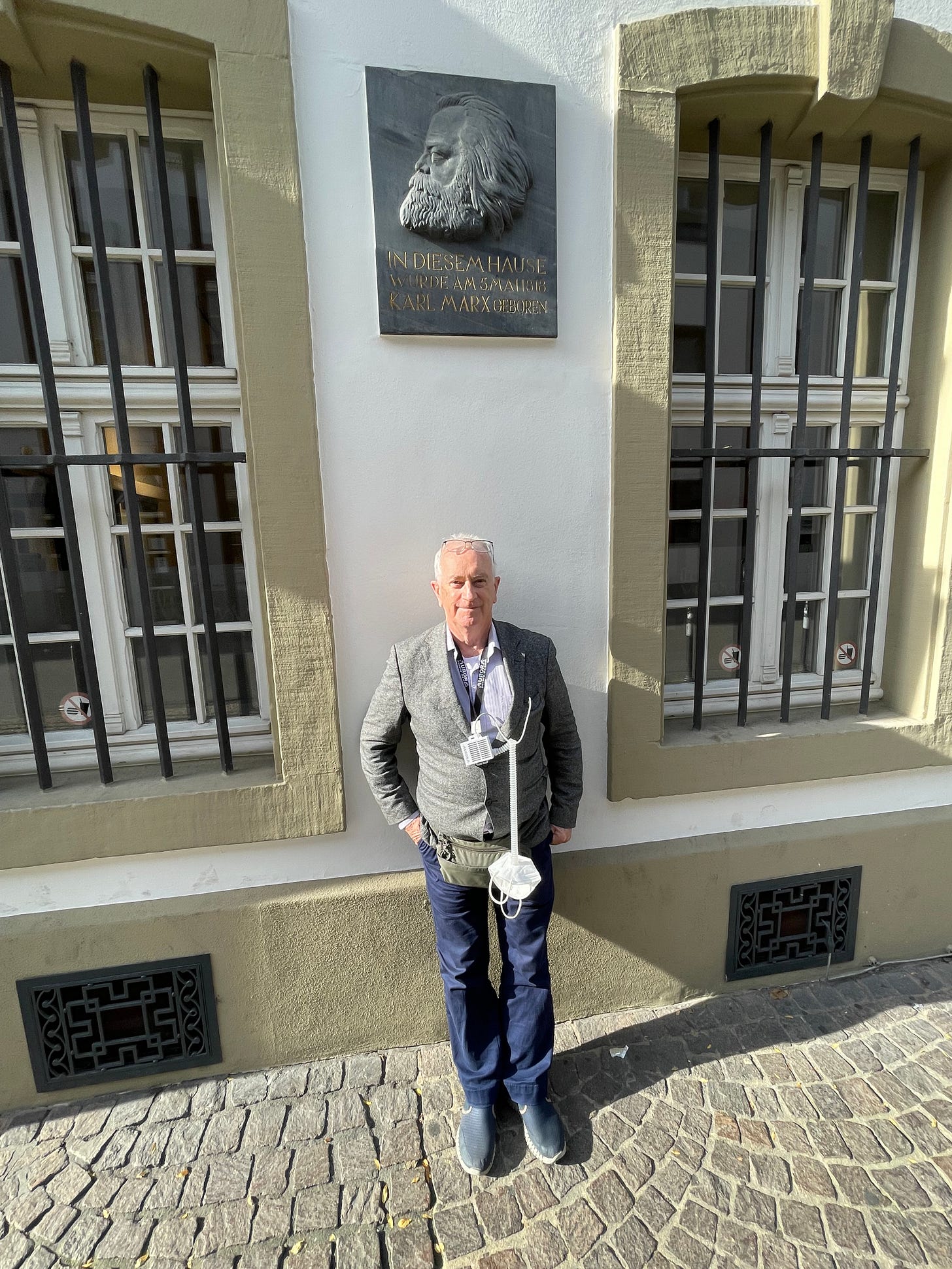The original focus of my academic career was the misinterpretation of Marx by his supposed followers. This thesis, which was written in 1989-90 for my Masters degree at the University of New South Wales, led to my first two academic papers, both published in the Journal of the History of Economic Thought in 1993.[1] I subsequently moved on to other topics—notably modelling Minsky’s Financial Instability Hypothesis[2]—but the ideas in this thesis never left my mind. In fact, they formed the philosophical foundation for all of my subsequent work.
When I found myself, by sheer serendipity,[3] in Marx’s hometown of Trier to receive a prize for my academic contributions—the Friede Gard Prize for Sustainable Economics[4]—I felt that it was time I made this thesis both more accessible and more presentable.
It has been posted on my websites for some years now, but the formatting was poor: I had originally written the thesis in the brilliant outline processor Framework, and formatted it using the equally brilliant desktop publishing program Ventura Publisher. Both of these programs were purchased by companies that truly didn’t understand their technology—Ashton-Tate in the case of Framework, and Corel Draw in the case of Ventura Publisher—and the programs eventually died. I was forced to port the text to Microsoft Word, and the porting process scrambled the footnotes (of which there are many—a total of 451 in the original, and 471 in this document).
I had just ignored this problem and lived with the resulting somewhat unsatisfactory presentation. But now that I was in Marx’s hometown, I felt it was time to produce something that gave proper recognition to one of the greatest—but also one of the most flawed, and certainly the most misinterpreted—thinkers in the history of economics.
I have also appended a paper which shows how Marx’s dialectics can be the methodological foundation for Post-Keynesian economics—“A Marx for Post-Keynesians”. There’s a tale as to why this paper was never published, but I’ll leave that as a mystery for now.
Since I can’t attach a PDF to a post on Substack, use this link to download the document from my Patreon site.
[1] Keen, S. (1993). "The Misinterpretation of Marx's Theory of Value." Journal of the History of Economic Thought 15(2): 282-300; Keen, S. (1993). "Use-Value, Exchange Value, and the Demise of Marx's Labor Theory of Value." Journal of the History of Economic Thought 15(1): 107-121.
[2] Keen, S. (1995). "Finance and Economic Breakdown: Modeling Minsky's 'Financial Instability Hypothesis.'." Journal of Post Keynesian Economics 17(4): 607-635.
[3] The Friede Gard Prize for Sustainable Economics (https://www.umwelt-campus.de/friede-gard-preis) is awarded annually at the Trier University of Applied Sciences, but the fact that this is Marx’s home town is sheer coincidence—since the founders of the prize happen to live nearby.
[4] https://www.umwelt-campus.de/campus/aktuelles/news/news-details/friede-gard-preis-2022.



Hegel was indeed enlightened. His dialectic is a precise codification of the process and mindset of wisdom which being the intellectual impulse of integrating/synthesizing opposites is the superior human mental discipline. Lack/refusal to integrate the truth(s) in opposites leads to the obsessive-compulsive dualism and hence rigid orthodoxies we increasingly see today, particularly in economics and politics. Wisdom should not (necessarily) be confused with religion which far too often has ended up simply being the creation of another orthodox and contentious dualism. Again, wisdom is the integrative/synthesizing mental process.
New paradigms like wisdom insights are deep truthful simplicities in that they are single operant concepts, that applied, synthesize opposites and create and change entire patterns. They are cybernetics, helio-centrism and agriculture, homesteading and urbanization. Authentic new paradigm concepts are the ultimate mental and temporal universe integrative phenomena.
Let us have a new paradigm in economics that deals with what you Dr. Keen have correctly identified as the area that neo-classical macro would have us ignore, namely money, debt and banks.